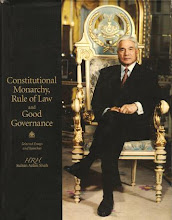
An intresting write up by By Baradan Kuppusamy
KARAK, July 5 — While many of her compatriots in DAP celebrated their party's best ever electoral results last March, Kamache Dorai Rajoo counted the cost of her 145-vote loss in the Sabai state seat, and made a life-changing decision.
She decided to leave her husband behind in Kuantan and uprooted the rest of her family — her mother and two children — to this small town at the foothills of Genting Highlands. The 39-year-old would stay back to fight for a chance to be elected by the people of this small town.
More than a year later — she now has a permanent service centre she mans with party volunteers — many locals are behaving like her constituents and flock to her office for help.
With the help of her 68-year-old mother Mariyamal, whom she sees as her biggest inspiration in life, Kamache continues her campaign to get elected.
Although a one street town, Kamache's new home has a Chinese new village, a KFC and MacDonald’s outlet and two police stations one at each end of the town, reminiscence of the days when it was a communist hotbed.
Her husband is putting up in Kuantan where he works as a senior supervisor with an oil palm mill belonging to Sime Darby and although he has applied for a transfer to Karak he has little chance of getting it, says Kamache.
She is determined to stay in Karak despite the odds.
“In Kuantan only my husband needs me but here in Karak the many people need me,” she said.
“They face numerous problems and see me as their Wakil Rakyat and come to me for help even though I lost,” Kamache said. “I can’t let them down.”
“I intend to stay here for good even though it is a struggle to stay afloat,” said Kamache in fluent English.
The 10th in a family of 11 children, Kamache studied in a Tamil school, picked up English working as a receptionist, was a ground staff for a German airline and is currently doing a masters in English with the Open University.
But it has all been downhill since she uprooted from Kuantan and set up camp in Karak in the Sabai constituency with about 10,000 voters.
She gave up a lucrative job teaching English that paid about RM8, 000 a month when she moved to Karak.
“I persuaded my husband to let me go as I was determined. After drifting in life I have found my vocation in life. Politics, serving the people, fighting for justice...these are what I want to do,” she said.
“One day I would want to take a seat in Parliament. This is my dream,” she said. For the moment it is a uphill battle.
After landing in Karak she looked for a job and has yet to land one.
She rents a house in Karak for RM500 a month and her service centre cost RM350 a month.
Unlike in Kuantan where she taught tuition for a handsome fee, in Karak she is teaching English for free as part of the DAP's service to the constituents.
Without a steady job or business Kamache is finding it tough to pay the rent. Her savings is fast depleting.
Her mother is helping out from her pension along with her husband who earns about RM4,000 a month.
He also pays the monthly instalment for their house in Kuantan and for a Chevrolet 1.8 Optra that was bought during the good times in Kuantan.
“I can last another month or two but after that only a miracle can save us,” she said.
To make ends meet the family drastically scaled down their lifestyles.
Her daughter Venosha, 15, has given up on school tuition and Indian classical dance lessons. Before they were chauffeured to school now they take the school bus.
The credit cards have been shelved and a upcoming trip to Budapest, on July 14, for a eight-day political training stint has also been cancelled.
"I tried to raise money for the trip but there’s just not enough,” Kamache said with a trace of regret.
On the personal front, her health is not balmy.
Her asthma has started to act up with the cooler and wetter weather in Karak and in addition she suffers from a live long battle with psoriasis, a skin disease which is suppressed by taking steroids. “Why do you think I always wear longs sleaves,” she joked adding “I have spent over RM200,000 in my life for a permanent cure but without success.”
The amazing thing is that it never crossed her mind to give it all up and go back to the secure and comfortable life she had in Kuantan.
“I am not a quitter and besides I am needed here. There are so many issues and problems I have taken up. I cannot just walk away,” Kamache said.
“I have fought all my life. I have survived one personal crisis after another. I don’t plan to give up,” Kamache said. “I can’t abandon the people here.” It was not always like this with her.
Although the family started poor on her father’s small income as a civil servant, she managed to get educated up to A-levels first in Ipoh and later in Jelapang where they moved on her father’s retirement in 1989.
They lived in a squatter settlement outside town.
“I worked in numerous places — at a hotel in Langkawi, as ground stewardess and as receptionist in Klang,” she said.
Her political initiation came one day in 1990 when she attended a forum on the plight of the Sri Lankan Tamil refugees in Meru, near Klang.
“That forum changed my outlook about myself and the world,” she said.
“That’s when I realised one had to look beyond self and one had to speak up against injustice.”
That realisation made her take an active interest in human rights issues and get involved in the struggle for freedom of minorities.
It was during this period that she got involved in the setting of the Tamil Foundation, an NGO that promoted Tamil education and culture.
Through this activity Kamache met activists lawyers like P. Pasupathy, M. Manoharan (currently Tamil Foundation chairman and Teluk Intan MP) and M. Kulasegaran (MP Ipoh Barat).
In the run up to the March 8 general election the DAP was keen to promote Indian women to stand for election as the party had never fielded one before.
Naturally Kamache, with her speaking talents and experience with grassroots rights activities was a natural choice.
“I was reluctant but was persuaded to take the plunge by YB Kula,” Kamache said. She was presented to the DAP veteran Lim Kit Siang and secretary general Lim Guan Eng and they were agreeable for Kamache to contest in the Sabai state seat.
“I arrived with my two children and my mother one day before parliament was dissolved (on Feb 13, 2008),” she said. “This was the first time I had stepped foot in Karak.”
The four of them slept on the floor of the DAP office in Karak for the next 25 days running a chaotic campaign with the help of the local DAP leaders against the well oiled campaign by BN candidate Datuk M Davendran.
On polling day she swept the urban votes but lost the bulk of the votes in Felda Serting. Overall she lost by a narrow 145 votes. “I cried for days, my mother cried, by children cried, DAP party workers cried. We were so close and yet we were defeated,” Kamache said recalling the agony of defeat.
Three days after the defeat she met her husband and told him she had made up her mind to return to Karak, set up office and serve the people and fight on.
Her husband agreed.
Her financial woes are just one of the many battles she faces.
She fights the bureaucracy, headquartered in Bentong about 30 minutes from Karak, for everything — health services to garbage collection, problems with birth certificates and provision of basic amenities.
“I don’t have time even to read the newspapers,” she said adding she is “vaguely” aware about the issues in Buah Pala village in Penang. “I have my hands full here.”
“Unlike before the DAP has to fight on several fronts now. We fight for all Malaysians. We are not perfect but we stay the course,” she said.











